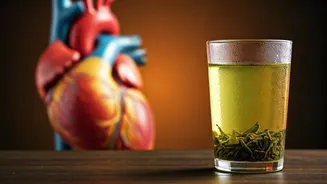Pomegranate Juice Power
Pomegranate juice stands out as a potential ally in the fight against artery plaque. Rich in antioxidants, it helps combat oxidative stress, which is a major
factor in the formation of plaque. Regular consumption of pomegranate juice can aid in protecting arteries by reducing the adhesion of cholesterol and preventing plaque from accumulating. Additionally, it has been shown to improve blood flow, a crucial element for cardiovascular wellness. Integrating pomegranate juice into your diet along with regular exercise can further enhance its heart-protective properties. It is important to note that while pomegranate juice offers various advantages, it is most effective when part of a holistic approach to heart health. Consult a healthcare professional for specific dietary recommendations.
Green Tea's Cardiovascular Boost
Green tea is another beverage that can contribute to reducing the risk of artery plaque. This popular drink contains high levels of catechins, a type of antioxidant that protects blood vessels. The antioxidants in green tea help to reduce inflammation within the arteries, preventing the initiation and progression of plaque. Furthermore, green tea can improve the function of the endothelium, the inner lining of blood vessels, leading to better blood flow. Consistent consumption of green tea is associated with lower LDL cholesterol levels (often called 'bad' cholesterol), which directly impacts plaque formation. For maximum benefit, it can be consumed throughout the day as part of a balanced diet and active lifestyle.
Hibiscus Tea's Potential Benefits
Hibiscus tea is known for its vibrant color and potential heart health benefits. The antioxidants in hibiscus, like those found in other drinks mentioned, combat oxidative stress, a key element in the development of artery plaque. Studies have shown that hibiscus tea can help lower blood pressure, a significant risk factor for plaque buildup. The tea's properties may also improve cholesterol profiles by increasing HDL (good) cholesterol levels. By incorporating hibiscus tea into your diet, you could support heart health. It’s important to prepare hibiscus tea correctly to extract its maximum benefits, and the tea can be enjoyed both hot and cold, making it a versatile addition to any routine.
Beetroot Juice for Arteries
Beetroot juice is a nutritional powerhouse when it comes to heart health. It is rich in nitrates, which the body converts into nitric oxide. Nitric oxide helps relax and widen blood vessels, leading to improved blood flow. The enhanced blood flow helps in reducing pressure on artery walls, and thereby reduces the chances of plaque developing. Moreover, beetroot juice has anti-inflammatory properties that can further protect the arteries. Regular consumption of beetroot juice can support overall cardiovascular function and is best combined with a heart-healthy diet and regular exercise. Adding beetroot juice to your routine may be a proactive step towards promoting a healthier cardiovascular system.
Turmeric Milk's Heart Support
Turmeric milk, often prepared with turmeric and other spices, offers several heart-protective advantages. Curcumin, the primary active compound in turmeric, possesses potent anti-inflammatory and antioxidant properties. These properties are critical because inflammation is a central factor in the formation of artery plaque. Regularly consuming turmeric milk can help reduce inflammation, preventing plaque from forming. Some research indicates that curcumin may improve endothelial function, which can improve blood flow and reduce the risk of plaque formation. Preparing turmeric milk with a small amount of black pepper further enhances the absorption of curcumin. Incorporating turmeric milk into your daily diet can potentially provide significant benefits for your heart health.





